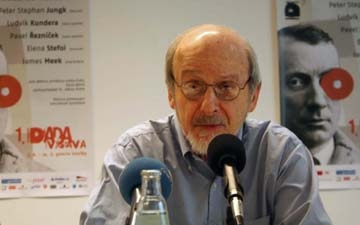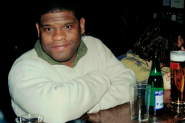Archives | Authors | Edgar Lawrence Doctorow
E. L. Doctorow United States of America PWF 2007, 1997

Widely regarded as one of America’s pre-eminent authors, Edgar Lawrence Doctorow has published some of the most important novels in contemporary letters. His style is at once accessible and philosophically dense, and he is known for his varied and subtle prose.
While his novels can be broadly classified as historical fiction, Doctorow has never been much of a stickler for “Historic Truth,” preferring to place historical figures in extraordinary situations. The novel, which made him a household name, Ragtime, was notable for its inclusion of early turn-of-the-century figures like Harry Houdini, Henry Ford, JP Morgan and Emma Goldman; it also featured Sigmund Freudand Carl Jung enjoying a ride together on Coney Island.
“His big topics challenging the official version of things,” says John G. Parks, author of E.L. Doctorow – Literature and Life, “because it’s usually the victors who tell the story and he feels that serious authors have a chance to challenge the official version of any story.”
E.L. Doctorow was born in 1931 to a musical family: his mother was an accomplished pianist and his father owned a music shop in the Bronx, where he was born and raised and has set much of his fiction. He has said that he grew up in “a lower middle-class environment of generally enlightened socialist sensibility.” His books bear out that commitment, often focusing on the poor and dispossessed, though he transcends the genre limits of social critique as deftly as he does those of historical fiction. After graduating from the Bronx High School of Science, he attended Kenyon College, then a hotbed of literary activity under the guiding hand of John Crowe Ransom. He received his B.A. from Kenyon in 1952 and continued on to Columbia University to pursue graduate work. He had to forego his studies when he was drafted in to the army and stationed in Germany. After his discharge he worked briefly at LaGuardia Airport as a reservations clerk, before becoming a book reader for Columbia Pictures. It was during these three years of reading nearly a novel a day that convinced him he could do what the authors he read did – and probably better. The novel that he wrote, Welcome to Hard Times, is the only Western in Doctorow’s oeuvre, but it prefigures his interest in history and character, as well as featuring an innovative framing device.
After his work with Columbia Pictures, Doctorow became an editor for New American Library in the early '60s; he was editor in chief for Dial Press from 1964 – 1969. It was during his time at Dial that he began working on The Book of Daniel. Fictionalizing the story of Julius and Ethel Rosenberg, Doctorow focused on America’s communist-baiting past as experienced through Daniel, their son. The book was nominated for a National Book Award and was a critical success. It was his next novel, though, that would catapult E. L. Doctorow into the circle of critically acclaimed and hugely bestselling authors, where he remains to this day.
Ragtime was published in 1975 to nearly universal acclaim. Charting pre-war America through three families and an assortment of historical personae, the novel also pays homage to Heinrich Von Kleist’s novella “Michael Kohlhaas.” Such allusiveness and play put Doctorow on the postmodern map. Frederic Jameson singled Ragtime out in his seminal work Postmodernism, or the Cultural Logic of Late Capitalism as an example of the crisis of historiography. Doctorow has published more than 15 books since Ragtime, including Billy Bathgate, which won a PEN/Faulkner Award and was the basis for a movie starring Bruce Willisand and Nicole Kidman. His novel The March (2005) tells the story of General Sherman’s scorched earth march through Georgia and the Carolinas in the final years of the Civil War. It was awarded both the National Book Critics Circle award (his second after Ragtime) and the PEN/Faulkner Award, and was a finalist for the Pulitzer Prize. E. L. Doctorow has also been awarded the Edith Wharton Citation for Fiction, the William Dean Howells Medal of the American Academy of Arts andLetters, and the prestigious National Humanities Medal, conferred by the president. His novel World’s Fair was awarded the National BookAward in 1986.
As Deborah Treisman, fiction editor at the New Yorker has said, “He is the world’s literary historian.”
Doctorow died of lung cancer in 2015.
Bibliography:
(1960) Welcome to Hard Times
(1966) Big As Life
(1968) The Songs of Billy Bathgate (short story)
(1971) The Book of Daniel
(1975) Ragtime
(1979) Drinks Before Dinner (play)
(1980) Loon Lake (novel)
(1982) American Anthem
(1983) Essays and Conversations
(1984) Lives of the Poets: Six Stories and a Novella
(1985) World's Fair
(1989) Billy Bathgate
(1993) Jack London, Hemingway, and the Constitution: Selected Essays 1977-92
(1994) Poets and Presidents: Selected Essays 1977-92
(1994) The Waterworks
(2000) City of God
(2002) Lamentation: 9/11 (text)
(2003) Reporting the Universe (nonfiction)
(2004) Sweet Land Stories
(2005) The March
(2006) Creationists: Selected Essays 1993-2006
(2009) Homer & Langley
(2011) All The Time in the World: New And Selected Stories
(2014) Andrew's Brain

E. L. Doctorow: The long view
26.01.2006 Articles
E.L. Doctorow eschews the small-scale focus of 'domestic' fiction and draws on historical events in his acclaimed novels. Now, at 75, his latest subject is the American civil war.





-6507dcf8af9e0_160x60.jpg)
